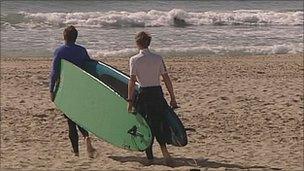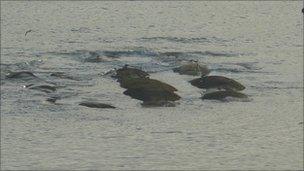Problems continue for Boscombe's over-budget surf reef
- Published

The reef was created to improve surfing conditions in Boscombe
It opened more than a year late and at a cost of £3m, nearly double the amount councillors had originally planned for.
But problems for Boscombe's artificial reef are far from over.
Since opening in November 2009, its performance has been branded "sub-standard" by experts, with many surfers claiming the waves break too abruptly and the ride is too short.
Now Bournemouth Borough Council has set up a task group to look into the problem.
The cross-party group, comprising councillors, the Boscombe Spa Village Project board and surfing experts, aims to find a solution for the troubled surf reef, which has so far failed to meet performance targets.
The council has not ruled out spending more money on it.
A spokeswoman said the group would be looking at "technical solutions" and their likely costs.
"Until those technical solutions are available for consideration, it is inappropriate to speculate on what they might be, who will undertake them or how much they will cost," she said.
But in a troubled economic climate, should the council be spending taxpayers' money on a project that has already gone so far over budget?
Bournemouth council's government grant for this year has been reduced by around £1.5m.
It is already making £8m of savings this year, with a further £8m identified for next year.
Between 2007 and 2012, a total of £27m of savings will have been made, the council said.
Councillor Basil Ratcliffe was the chairman of the works and transport committee in 1998 when the idea for the reef was first discussed.

Mr Weight said the reef was mainly used by body boarders
He said he was against spending "a penny more" of taxpayers' money on the reef.
"We cannot afford it," he said. "I would have thought it was absolutely simple - the people who built it must put it right."
In May, experts at Plymouth University released results of a six-month quality assessment of the waves enhanced by the reef.
They found it only achieved four of its 11 objectives.
But the reef's creators, New Zealand-based ASR Ltd, denied it had failed and said it had data to confirm only one of the criteria - the wave lengths - had not been met.
ASR, which has designed similar reefs in Mount Maunganui on the north island in New Zealand, and Narrowneck, Australia, said in May that the firm and the council were discussing ways of "making enhancements to the reef".
The council has said it will withhold a £150,000 payment from ASR until it is satisfied it works.
David Weight, chairman of Wessex Surf Club, who first approached the council with the idea to build an artificial reef, said the underwater creation, nicknamed by surfers as Weight's Reef, was "90% there".
"I do not think it would need a huge amount of money to create a huge increase in value," he said.
"I suspect it may need a quarter of a million pounds. The potential is it will increase the value at least five-fold.
"The council needs to capitalise on the work that's already done.
Body boarders
"It's 90% there and it would be wrong to just stop and write it off at this point."
The artificial reef, Europe's first, was created to improve surfing conditions using 55 sand-filled "geotextile bags" which are 225m (740ft) out to sea.
But Mr Weight said it was mainly being used by body boarders - who do not stand up on boards like surfers - because the waves are abrupt, which causes difficult conditions for surfing.
"The performance is somewhat less than it should be," Mr Weight said. "I do not think it needs a great deal physically to make it a great deal better."
The task group will report back to the council by October.
The council spokeswoman added: "The council has a £150,000 funding envelope already allocated to the surf reef, and ASR is the only company to design artificial surf reefs, with the greatest global experience in building them, and therefore these will both be considerations for the Task and Finish Group."
- Published14 July 2010